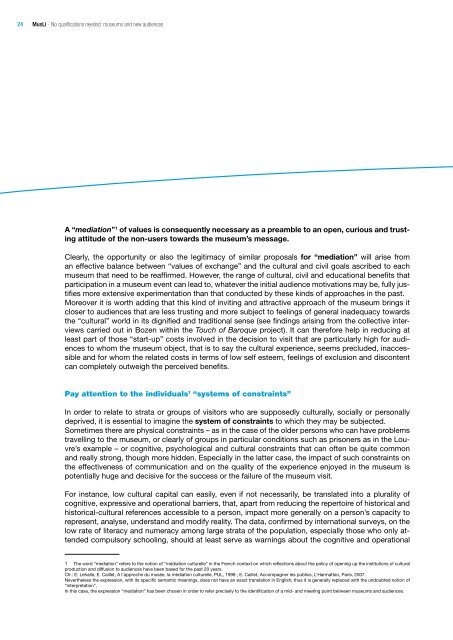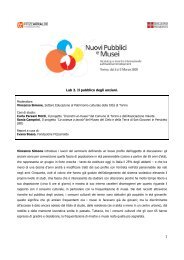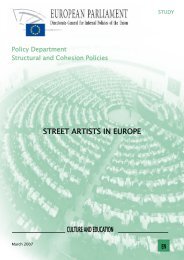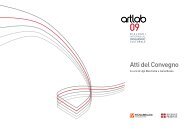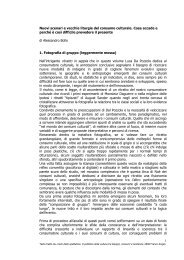MusLi (Museums Literacy) - Fondazione Fitzcarraldo
MusLi (Museums Literacy) - Fondazione Fitzcarraldo
MusLi (Museums Literacy) - Fondazione Fitzcarraldo
Create successful ePaper yourself
Turn your PDF publications into a flip-book with our unique Google optimized e-Paper software.
24 <strong>MusLi</strong> - No qualifications needed: museums and new audiences<br />
A “mediation” 1 of values is consequently necessary as a preamble to an open, curious and trusting<br />
attitude of the non-users towards the museum’s message.<br />
Clearly, the opportunity or also the legitimacy of similar proposals for “mediation” will arise from<br />
an effective balance between “values of exchange” and the cultural and civil goals ascribed to each<br />
museum that need to be reaffirmed. However, the range of cultural, civil and educational benefits that<br />
participation in a museum event can lead to, whatever the initial audience motivations may be, fully justifies<br />
more extensive experimentation than that conducted by these kinds of approaches in the past.<br />
Moreover it is worth adding that this kind of inviting and attractive approach of the museum brings it<br />
closer to audiences that are less trusting and more subject to feelings of general inadequacy towards<br />
the “cultural” world in its dignified and traditional sense (see findings arising from the collective interviews<br />
carried out in Bozen within the Touch of Baroque project). It can therefore help in reducing at<br />
least part of those “start-up” costs involved in the decision to visit that are particularly high for audiences<br />
to whom the museum object, that is to say the cultural experience, seems precluded, inaccessible<br />
and for whom the related costs in terms of low self esteem, feelings of exclusion and discontent<br />
can completely outweigh the perceived benefits.<br />
Pay attention to the individuals’ “systems of constraints”<br />
In order to relate to strata or groups of visitors who are supposedly culturally, socially or personally<br />
deprived, it is essential to imagine the system of constraints to which they may be subjected.<br />
Sometimes there are physical constraints – as in the case of the older persons who can have problems<br />
travelling to the museum, or clearly of groups in particular conditions such as prisoners as in the Louvre’s<br />
example – or cognitive, psychological and cultural constraints that can often be quite common<br />
and really strong, though more hidden. Especially in the latter case, the impact of such constraints on<br />
the effectiveness of communication and on the quality of the experience enjoyed in the museum is<br />
potentially huge and decisive for the success or the failure of the museum visit.<br />
For instance, low cultural capital can easily, even if not necessarily, be translated into a plurality of<br />
cognitive, expressive and operational barriers, that, apart from reducing the repertoire of historical and<br />
historical-cultural references accessible to a person, impact more generally on a person’s capacity to<br />
represent, analyse, understand and modify reality. The data, confirmed by international surveys, on the<br />
low rate of literacy and numeracy among large strata of the population, especially those who only attended<br />
compulsory schooling, should at least serve as warnings about the cognitive and operational<br />
1 The word “mediation” refers to the notion of “médiation culturelle” in the French context on which reflections about the policy of opening up the institutions of cultural<br />
production and diffusion to audiences have been based for the past 20 years.<br />
Cfr.: E. Lehalle, E. Caillet, A l’approche du musée, la médiation culturelle, PUL, 1998 ; E. Caillet, Accompagner les publics, L’Harmattan, Paris, 2007.<br />
Nevertheless the expression, with its specific semantic meanings, does not have an exact translation in English; thus it is generally replaced with the undoubted notion of<br />
“interpretation”.<br />
In this case, the expression “mediation” has been chosen in order to refer precisely to the identification of a mid- and meeting point between museums and audiences.


